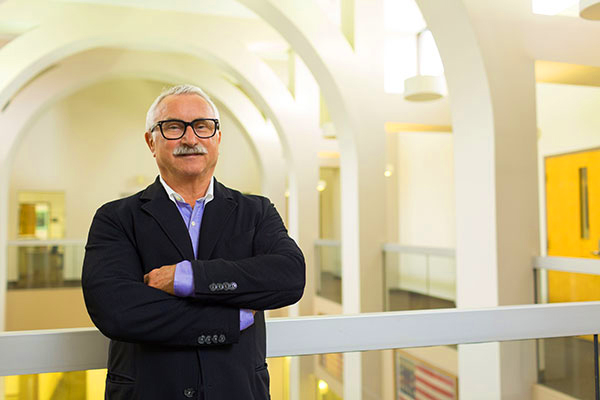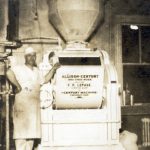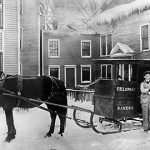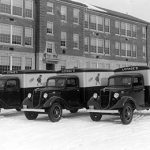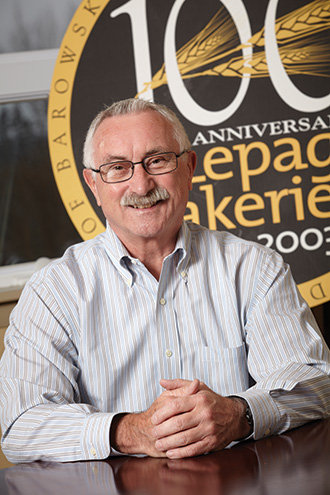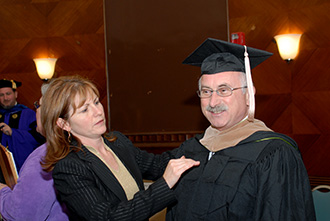Albert Lepage (MBA ’71) relied on innovation and entrepreneurial thinking to grow his company into one of the nation’s leading independent producers of baked goods. Now, through a landmark gift to the A. B. Freeman School of Business, the former chairman of Lepage Bakeries Inc. hopes to deliver entrepreneurial skills not only to students but to small business owners across the Gulf South As well.
“A lot of people talk about what might be the greatest thing since sliced bread, but in my line of work, nothing is better than sliced bread.”
Albert Lepage (MBA ’71) is joking, but not entirely. Until his retirement in 2014, Lepage served as co-chairman of Lepage Bakeries Inc., the 112-year-old maker of bread, rolls, English muffins and donuts sold throughout the Northeast under the brand names Country Kitchen and Barowsky’s. He joined the family-owned business in 1971 and guided its growth until 2012, when he and co-owner Andrew
Barowsky sold the company to Flowers Foods. In those 41 years, Lepage built the Maine-based company into one of the nation’s largest privately held wholesale bakers, with 550 employees at three plants and over $166 million in annual sales.
Much of that growth Lepage attributes to innovation and entrepreneurial thinking, so it wasn’t surprising when, in April 2015, he announced that he was donating $12.5 million to Tulane University’s A. B. Freeman School of Business to establish a new center dedicated to the study and practice of entrepreneurship.
The Albert Lepage Center for Entrepreneurship and Innovation will oversee and coordinate all the business school’s entrepreneurship efforts, including creating new courses, supporting scholarly research and developing new co-curricular programs. Initiatives tentatively planned for the center include enhanced experiential learning opportunities for students, an entrepreneurs-in-residence mentoring program, interdisciplinary faculty fellows in entrepreneurship, a re-envisioning of the Tulane Family Business Center, seed funding for budding student entrepreneurs, and an incubator for student-led ventures to foster new product development through the design, testing, marketing and sales phases. The Levy-Rosenblum Institute for Entrepreneurship, which had led the Freeman School’s entrepreneurship efforts since 1991, will fall under the new center.
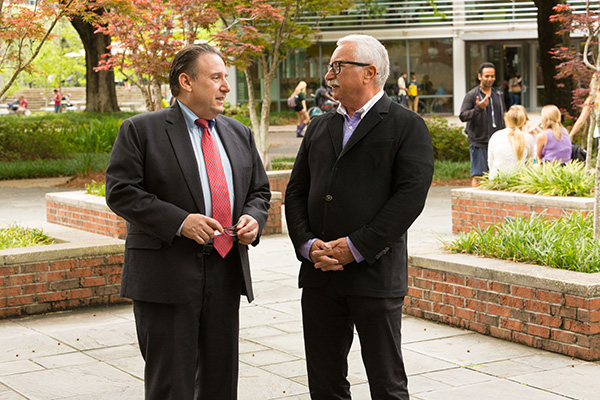
Freeman School Dean Ira Solomon, left, talks with Lepage prior to this year’s Tulane Business Model Competition. Solomon says Lepage’s gift has the potential to transform entrepreneurial education at the Freeman School.
In keeping with Lepage’s intentions, the center will also have a significant community outreach component with programs designed to bring entrepreneurial research and expertise to small and disadvantaged businesses throughout the Gulf South.
“Community outreach was a very important part of what I was interested in doing,” says Lepage. “Especially post-Katrina, I think it’s critical to bring entrepreneurship and innovation to underserved communities as well as the well-served — to everyone — to help the region come back to even great glory than it had in the past. A lot of this already existed at the Freeman School. It was just a question of pulling it all together and providing a funding vehicle to make it even stronger.”
“Albert’s gift is transformative in the truest sense of the word,” says Ira Solomon, dean of the Freeman School. “It provides us with the financial resources required to turn what was already a successful program into a nationally recognized center of excellence that encompasses outstanding teaching, impactful research and extensive outreach to the community.”
Tulane President Michael Fitts is even more succinct. “It’s a game changer,” he says.
Lepage’s extraordinary gift is part of a pattern. According to friends, he’s spent the better part of his career quietly providing major support for causes close to his heart.
“He’s very generous with his money as well as his time,” says Nancy Goldstein (MBA ’71), his Freeman School classmate and friend of more than 40 years. “He’s not going to say this about himself, but clearly this is something that’s obvious to anyone who knows him.”
“He’s overly generous; that’s just the nature of the man,” adds Mike Hartstein, who serves with Lepage on the Fire Island Pines Property Owners Association in New York and worked with him on a $3 million campaign to build a new community center on the island. “It’s gotten to the point where people ask questions like, ‘What would Albert want done?’ You want him to be pleased because he’s so supportive.”
Over the last 20 years, Lepage has volunteered his time and expertise to a host of organizations, including serving as chairman of St. Mary’s Health System, one of Maine’s largest health care providers, and as vice chairman and treasurer of the board of Hebron Academy in Hebron, Maine, his former prep school. During that time, Lepage donated funds to establish the Regis A. Lepage Surgical Pavilion, the F.R. Lepage Conference Center and the Corinne Croteau Lepage Women’s Health Pavilion at St. Mary’s Regional Medical Center in Lewiston, Maine, and the Lepage Fitness Center and Lepage Center for the Arts at Hebron Academy. He has also served on the Portland Symphony Orchestra Board of Trustees, the Lewiston Auburn Arts Board of Directors, the Maine Arts Commission and the Maine Governor’s Business Council. In 2011, Maine’s Good Shepherd Food Bank honored Lepage with its JoAnn Pike Humanitarian Award in recognition of his charitable efforts.
Lepage has also devoted his charitable efforts to Tulane University. A longtime member of the Business School Council, he donated funds in 2007 to establish the Albert R. Lepage Professorship in Business, an endowed professorship designated for instructors specializing in entrepreneurship. In 2006, he received the Freeman School’s Outstanding Alumnus Award, and in 2011 he was named Tulane’s Distinguished Entrepreneur of the Year.
At first glance, you might wonder how an executive in one of the oldest industries known to man — baking bread — would become interested in entrepreneurship, an area of business more frequently associated with cutting-edge products and hightech
startups, but Lepage is proof that entrepreneurial thinking can help any organization grow and achieve its goals.
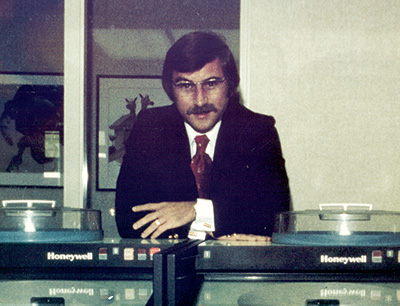
Lepage Bakeries was one of the first baking companies in the nation to embrace computer technology. Here Lepage poses with the company’s first computer in 1972.
“We had an entrepreneurial spirit, and we tried to instill that in everyone in the company,” Lepage says of the business. “We were innovators. We did everything that we could on the innovation side to become more productive.”
In the mid-1980s, Lepage Bakeries became one of the first direct-store-delivery (DSD) companies in the nation to equip its drivers with hand-held computers, predating even Federal Express. Within a few years, virtually every DSD company adopted the technology. The company also innovated in the
production process, introducing new ingredients to improve the baking process and new technologies, such as robotics, to improve efficiency. The company’s aggressive approach to growth, technology and productivity led Bakery Production and Marketing, the industry’s leading trade publication, to name Lepage Bakeries its Wholesale Baker of the Year in 1993.
The company’s commitment to innovation didn’t stop. In 1994, it opened a new, state-of-the-art plant in Brattleboro, Vermont, to keep up with growing demand for its products. As recently as 2010, the company moved its entire sales management reporting system to the cloud, another bold decision that ended up paying off.
Lepage discussed that decision and the company’s history of pushing boundaries in 2011 when he received Tulane’s Distinguished Entrepreneur of the Year Award. “We have taken risks to transform the production process and the control of that process with innovative systems so that levels of productivity have increased by orders of magnitude,” he said at the awards ceremony. “We’re always looking for new ways to automate, new ways to improve productivity, and we’re always willing to take those risks.
“We still make sliced bread,” he added, “but the way we bake it, package it and track it has been totally transformed by the intelligent application of the most advanced computer technologies.”
Much of that transformation took place after 1971, when Lepage, fresh out of the Freeman School, joined the family-owned company as treasurer. Lepage Bakeries had been founded in 1903 by Albert’s grandfather, Francois Regis Lepage, a French-Canadian from the Quebec City area who emigrated to Lewiston, Maine, in the late 19th century. In 1933, F. R. Lepage’s only son, Regis A. Lepage, joined him in the business. A graduate of the University of Montreal with an MBA from Boston University, Regis brought formal business training to the company, guiding it through the Great Depression and World War II and overseeing the introduction of its Country Kitchen brand in 1951 and the development of its “batter whipped” continuous-mix bread in 1954.
By the time Albert joined the business, his father was approaching retirement age and the company was preparing for a transition. A smart and perceptive businessman, Regis Lepage had hired a younger executive to run the company in the wake of his retirement. The expectation was that the executive would lead the company into the next generation, when Albert would presumably be ready to take the reins. Just seven years later, however, in 1978, the executive abruptly resigned to take a job with a competitor. At the age of 31, Albert Lepage was thrust into the role of president, a position he hadn’t expected to take on for at least 20 years. Lepage says the crisis taught him one of business’s fundamental lessons.
“No matter how well you plan, some unexpected thing that you never saw coming is going to happen in your business career,” he says. “The question is, do you have the strength and moral courage to face it and deal with it? That’s what’s going to make you a successful leader or not.”
The executive’s resignation ended up being one of the best things that could have happened to the company. Following his departure, Lepage and Andy Barowsky, an accountant who had joined the business from Arthur Andersen a year before, took on joint leadership of the company. The two executives immediately clicked. Barowsky went on to become co-owner of the company and the two men — Barowsky as president and CEO and Lepage as chairman — ran the company in partnership for the next 34 years, growing it into one of wholesale baking’s biggest privately held firms. They also became well-known and influential figures in the industry. Lepage served as chairman of the Quality Bakers of America Co-operative, the national licensor of Sunbeam Bread, and as treasurer of the American Bakers Association, while Barowsky served as chairman of the Independent Bakers of America.
Lepage still marvels about their remarkable run as co-owners.
“From 1978 to 2012, not once did we ever disagree on anything that had to do with business,” Lepage says. “Not once.”
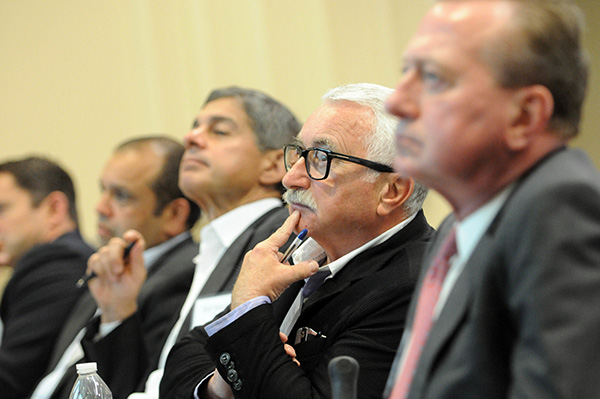
In the last 10 years, Lepage has become an increasingly active supporter of the Freeman School, including, above, serving as a judge for the 2015 Tulane Business Model Competition.
In May 2012, Lepage and Barowsky agreed to merge Lepage Bakeries with Flowers Foods. The merger enabled Georgia-based Flowers to expand its reach into the lucrative New England and New York markets, where Country Kitchen and Barowsky’s had long been dominant.
Lepage and Barowsky remained as co-chairmen of the company, which continues to operate as a wholly owned subsidiary of Flowers.
“The time was right,” Lepage says of the merger. “If you aspired to be a national baking company, you needed that New England market, and we were it. It was the right time to merge.”
Since his retirement in 2014, Lepage has devoted his time to traveling and doing volunteer and charitable work, but he has one stipulation.
“I don’t want to have to meet a schedule,” he laughs. “I don’t want to be beholden to anyone’s schedule. One of the only meetings I actually make time for is the Business School Council. I enjoy coming back to New Orleans, and the Lepage Center for Entrepreneurship and Innovation gives me a reason to visit and stay engaged.
“Entrepreneurship played a big role in my life,” Lepage adds, “so I’m very happy to be able to support Tulane and bring entrepreneurship education to students at the Freeman School as well as small business owners in New Orleans and across the Gulf South.”

